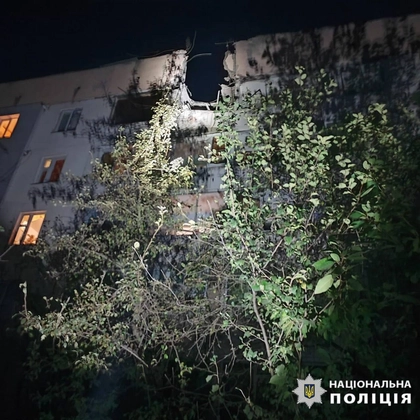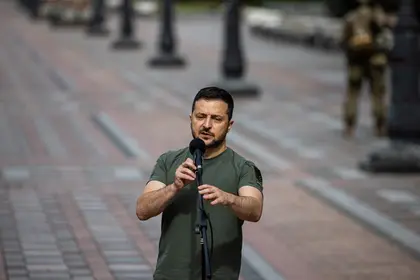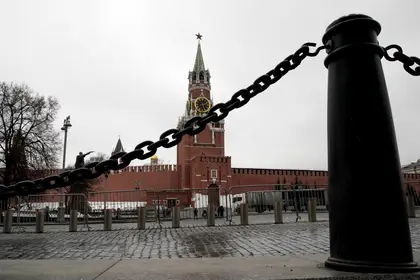Moscow has rejected a proposal from President Volodymyr Zelensky to begin withdrawing Russian troops over the Christmas period. But what did the proposal entail, and, more importantly, are negotiations to end the war even possible?
JOIN US ON TELEGRAM
Follow our coverage of the war on the @Kyivpost_official.
What was Zelensky’s offer?
Well, it was more of a demand. The Ukrainian president remains firm in his belief that Russia must halt its ongoing attacks and withdraw troops from all Ukrainian territories it is illegally occupying.
On Dec, 12, Zelensky urged leaders of the G7 to support his call to convene a special Global Peace Formula Summit, saying: “No matter what the aggressor intends to do, when the world is truly united, it is then the world, not the aggressor that determines how events develop.”
What’s the Global Peace Formula Summit all about?
First proposed by Zelensky in his G20 address in November, a ten-point-plan was labelled by the president as a “vision of the path to peace.”
“Ukraine should not be offered to compromise its conscience, sovereignty, territory, and independence,” he said, adding that “if Russia claims that it wants to end this war, let it prove its words with actions.”
Ukraine’s ten propositions are explained below:
1. Radiation and nuclear safety: With Russia currently occupying the nuclear power plant in Zaporizhzhia – the largest in Europe – this proposal is of great importance;

Kyiv Hit by Massive Drone Attack as Russian Strikes Target Multiple Ukrainian Cities
2. Food security: Russia’s illegal occupation of Mariupol and other sea ports have severely disrupted Ukraine’s grain shipments, taking food out of the mouths of innocent families as far away as Africa;
3. Energy security: With the use of missiles and Iranian-made drones, Russia has knocked out up to 40 percent of Ukraine’s energy infrastructure, causing ongoing blackouts across the nation. These can have deadly consequences for many during the winter, with temperatures in Ukraine currently dropping below a bone-rattling -6 degrees Celsius. Furthermore, Russia’s weaponization of its gas supplies is biting into the wallets of millions of civilians across Europe;
4. Release of all prisoners and deportees: Whilst prisoner swaps have taken place, many Ukrainian and Russian troops still remain in captivity, whilst thousands of Ukrainians, including children, have been illegally deported to Russia from Ukrainian cities such as Mariupol;
5. Implementation of the United Nations (UN) Charter and restoration of Ukraine’s territorial integrity and the world order: For those interested in embarking on a read of biblical proportions, the full UN Charter can be read here. But, to summarize, it’s basically a constitutive instrument. Signed in 1945 upon the end of World War II, it mandates the UN and its member states to maintain international peace and security, and uphold international law;
6. Withdrawal of Russian troops and cessation of hostilities: This is a no-brainer. Peace in Ukraine cannot be achieved whilst Russian boots remain on Ukrainian soil.
7. Justice: Understandably, Ukraine wants the perpetrators of the many war crimes committed by Russia during this war to be punished. The UN and human rights groups have documented cases of rape, torture, executions, and other human rights abuses – but to date little has been done to bring those who committed such evil acts to justice;
8. Immediate protection of the environment from ecocide: According to an August report by Yale, “around 30 percent of Ukraine’s protected areas, covering three million acres, have been bombed polluted, burned, or hit by military maneuvers.” Ukraine seeks to protect its beautiful land, nature, wildlife, and environment.
9. Preventing escalation: Even if a peace deal is struck, Russia has proven it cannot be trusted to stick to it. That aside, Vladimir Putin has frequently saber-rattled with the use of not-so-subtle comments essentially amounting to nuclear blackmail. Neighboring nations have also voiced their concerns over the war spilling across the border. World leaders must come together to ensure the war doesn’t get even worse than it already is;
10. Confirmation of the end of the war: An official acknowledgement is essential to ensure that both sides are on the same page, and that it is crystal clear that the war is over.
These points have since been boiled down to just three steps: i) more weapons to be sent to Ukraine so it can better defend itself; ii) the protection of Ukraine’s energy infrastructure; and iii) convening the Global Peace Formula Summit, at which the other points will be discussed.
How did Russia respond?
As you’d expect, not very well. On Dec. 13, Kremlin spokesman Dmitry Peskov dismissed the peace proposal, telling reporters that Ukraine needed to accept new territorial “realities.”
In a nutshell, Russia wants to keep the lands it has stolen. These include four regions that Peskov claimed are “new subjects that have appeared in the Russian Federation… as a result of referendums that took place in these territories.” These referendums, however, have been slammed as illegal by the international community, and saw widespread voter intimidation and other forms of electoral fraud.
Okay, but is peace still possible?
Peace is always possible – but it must first be negotiated. With Russia wanting Ukraine to essentially abandon a large part of its own land and huge swathes of its people, and the Ukrainian government, and indeed the Ukrainian people, naturally not wanting to allow that to happen, negotiations don’t look likely in the near future.
In fact, the possibility of negotiations have been dismissed not only by Russia, but also by Ukraine and leaders involved in the ongoing war.
On Dec. 9, former British Prime Minister Boris Johnson, who has shown staunch support for Ukraine, wrote in the Wall Street Journal that negotiations with Russia were impossible and that the war in Ukraine could only end with Putin’s defeat.
“Russian forces must be pushed back to the de facto boundary of Feb. 24,” Johnson wrote. “There is no way Volodymyr Zelensky or the Ukrainian people could conceivably accept another outcome – not after the savagery they have endured. There is no land-for-peace deal to be done, even if Mr. Putin were offering it and even if he were to be trusted, which he is not.”
So, is the proposed Global Peace Formula Summit already dead in the water?
No. Not only is such a summit vital for refocusing world leaders on bringing about an end to the war, it will also allow a brainstorming of sorts that could come up with other potential ways to prevent further bloodshed.
In his address to the G7 group of nations on Dec 12, Zelensky pressed Ukraine’s allies to hold the summit, and in a phone call with U.S. President Joe Biden a day earlier, at least two of the points listed in Zelensky’s proposals were discussed – the supply of more weapons, which the U.S. and other allies have agreed to, and the protection of Ukraine’s energy infrastructure.
Will the summit be held? That’s another matter – but with most of the world uniting behind Ukraine since the first day of Russia’s brutal invasion, the summit’s convening is, thankfully, more likely than not.
You can also highlight the text and press Ctrl + Enter






